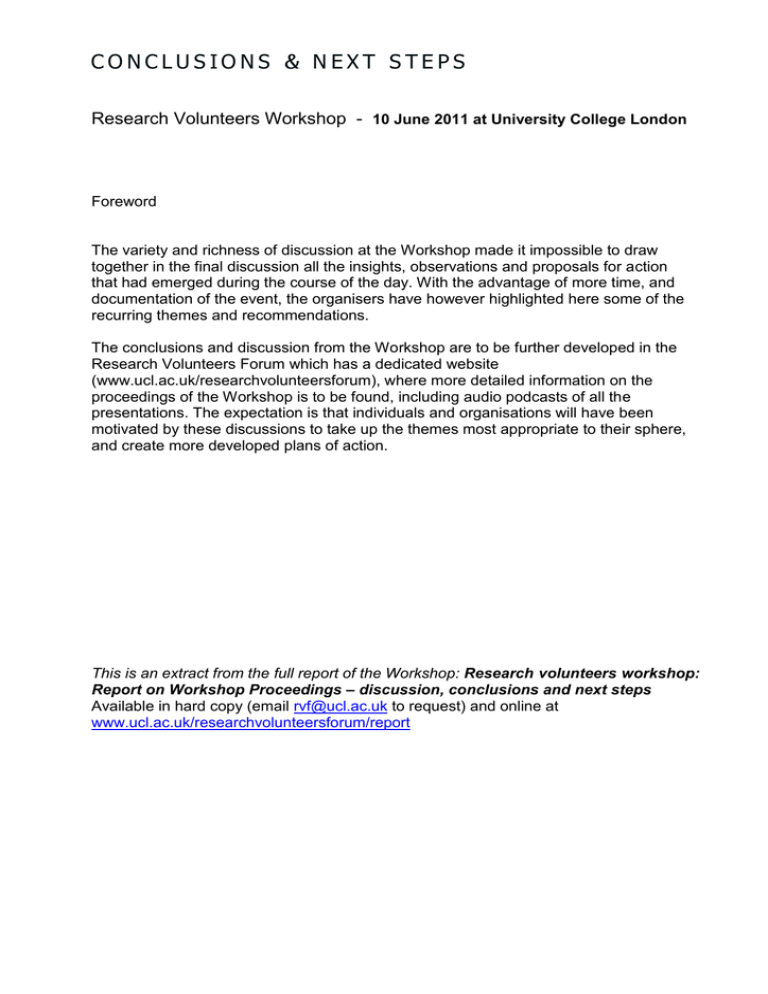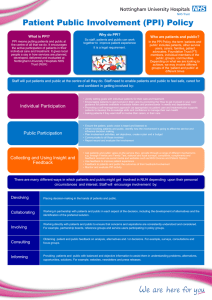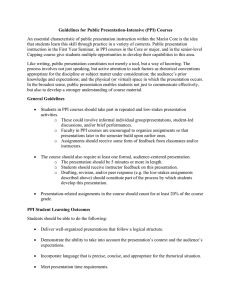C O N C L U S I O N S... Research Volunteers Workshop -
advertisement

CONCLUSIONS & NEXT STEPS Research Volunteers Workshop - 10 June 2011 at University College London Foreword The variety and richness of discussion at the Workshop made it impossible to draw together in the final discussion all the insights, observations and proposals for action that had emerged during the course of the day. With the advantage of more time, and documentation of the event, the organisers have however highlighted here some of the recurring themes and recommendations. The conclusions and discussion from the Workshop are to be further developed in the Research Volunteers Forum which has a dedicated website (www.ucl.ac.uk/researchvolunteersforum), where more detailed information on the proceedings of the Workshop is to be found, including audio podcasts of all the presentations. The expectation is that individuals and organisations will have been motivated by these discussions to take up the themes most appropriate to their sphere, and create more developed plans of action. This is an extract from the full report of the Workshop: Research volunteers workshop: Report on Workshop Proceedings – discussion, conclusions and next steps Available in hard copy (email rvf@ucl.ac.uk to request) and online at www.ucl.ac.uk/researchvolunteersforum/report CONCLUSIONS & NEXT STEPS ________________________________________________________________ Our general conclusion was that the question of research on (or with) human beings must involve consideration at both the macro and micro levels. Here, macro was understood as the level of the social and political., including issues of ‘the politics of clinical trials’, the inequalities of power embedded in social structures, the assumptions and characteristics of systems of research governance, and the immense diversity of both clinical studies and research participants which made generalisation difficult. The micro level embraced the experience and expectations of the individual research participant (still a relatively underinvestigated topic), as well as the scrutiny of individual clinical studies which makes up much of the day-to-day work of research regulatory systems (via ethics committees), and patient or consumer liaison groups. The division is of course notional, in practice the micro and the macro are embedded each in the other. The distinction becomes useful however when considering matters like the actual or potential role of public, patient and participant involvement in ameliorating or reforming current policies and practice. Micro level issues Professor Blume, in the conclusion to his address pointed to the need to understand issues at the individual level to appreciate the underlying politics: ‘In summary: to appreciate the inherently political nature of medical research, we have to understand its meaning for potential volunteers, their assessment of the likelihood of its benefiting themselves, their children or their community and the ways in which the local political economy of health shapes the choices available to them.’ Comments and recommendations for action: 1. Steps lying mainly in the purview of patient organisations and partnership groups Many of those active in public/patient involvement (PPI) felt the lack of any clear pattern for relationships between the PPI groups and participants: there was a lack of clarity about roles within the groups and about what was expected of the different parties involved. This needs to be explicitly addressed. PPI activity, following the pattern of regulation and funding for research, tends to be frontloaded. This has reduced the capacity of PPI groups to follow through the complete participant experience and give attention to matters such as the operation of complaints systems or participant anxieties. PPI groups need to extend their involvement with individual clinical studies to include these areas. Patient groups have been held back from developing direct channels of communication with research participants because current rules of confidentiality deny them access. These rules need to be rethought in order to establish more effective liaisons between patients on Management Groups and individual participants. In some situations, those involved in trial design could alleviate this problem by inserting a clause into standard research consent forms that permits this kind of communication. It was widely agreed that giving feedback to research participants on results and acknowledging their contribution were important steps, but often omitted. There was scope for encouraging Ethics Committees, professional bodies or umbrella CONCLUSIONS & NEXT STEPS organisations to make observance of this courtesy a condition of approval or membership. Approaches should be made to carry this forward. 2. Steps for increasing understanding of the different meanings of ‘research participation’ It was suggested that better understanding in this area was a key to forging productive working relationships between researchers and participants, to the benefit of both parties. This should include: • Recognition of the different roles of research participants. These occur along a spectrum of empowerment (ranging roughly from ‘research subject’ to ‘collaborator’) and can potentially evolve during the course of a project. Participants find themselves situated in a huge range of research projects from those with a relatively trivial impact on the volunteer, to others with life and death consequences, and involve participants in differing states of dependency on health care. • Recognition that the participants’ expectations, assumptions and interpretations of what is going on in the research may be different from those of the researchers. • Use of a reflection on terminology (subject, collaborator, partner, guinea pig etc) as a framework (a) for researchers to look critically at their own practice and question their assumptions about volunteers’ expectations or understandings, and (b) for participants in assessing the quality of their experience and the contribution they were allowed to make. Macro level issues In the course of the discussions, the workshop participants identified a number of general principles or issues they considered of greatest importance for a sound clinical research system and ensuring a positive experience for all participants, in whatever capacity. Trust Trust was agreed to be crucial but typically depended on matters extending beyond the confines of any individual study. It included participants’ general perceptions of the medical profession, and of the power and motives of the pharmaceutical industry. It framed their questions about whether the process of informed consent was there to protect physicians and health providers or to protect the participants. There was also a delicate relationship between trust and regulation. Lack of trust led to demand for more regulation; but additional regulation might lead to formal compliance only (the tickbox mentality) and give false reassurance. Recommendations about changes to regulatory systems and bureaucracy (see below) attempted to address this question. Gaps in regulatory system Of major concern were the areas not covered by current UK regulatory systems, the workshop identified two major deficits: • Current regulatory frameworks focus on participants’ immediate physical and emotional wellbeing and fail to address important social issues. These issues include sharing information with participants through regular feedback, availability of treatments CONCLUSIONS & NEXT STEPS post trial, artificiality of trial conditions, assumptions made about participants’ roles, complaints procedures. Patient and participant input could be of crucial importance here. • There is a lack of attention to the deficiencies of commercial trials in matters of public involvement and of variable scientific standards. It was agreed that this topic needed to move up the public agenda. Bureaucracy There was concern at what was perceived as unnecessary or inappropriate regulation. Suggestions for action included: • Thinking through the whole system afresh starting from what participants/patients need. This radical proposal was well supported but could not be extensively developed in the course of the meeting. It has been noted as a key point for follow-up. • Encouraging NRES to take further their initiatives in matters such as proportionate review, and to review restrictions on access to participants or potential participants. • Continue to improve system transparency. Knowledge sharing The workshop participants addressed the question of knowledge sharing from different angles. There was discussion on the sharing of intellectual property, though this was not pursued in depth. At the workshop, the main issues about knowledge sharing concerned the kind of information that is needed to meet the expectations of proactive patients, patient groups and potential participants. These included: • Feedback from trial organisers to research participants (as identified earlier) and recognition of their contribution to the research and status as partners, rather than ‘subjects’. • Putting information into the public domain about available trials for those who would be interested in enrolling. Recent progress in making such information available was noted but there was still room for making it more patient-friendly. • Availability of information about clinical trials that had negative or inconclusive results. It was emphasised that active patients and patient groups with an interest in research valued such information and considered it a benefit, as much as the professional research community. • The development of Ethics Committee practice to encourage these trends and require publication of summaries of research was welcomed, and would be followed with interest. Patient choice Three main points for vigilance and policy influence were noted under this heading: • Social structural, and national policy influences that could restrict patient choice will require further debate beyond the workshop. These include the lack of alternative health care, the blurring of research and care borders (research as higher quality care), and social pressures to enrol. • Physicians’ restrictive or selective approach to eligibility or suitability of entrants to clinical trials (or other clinical studies) could be construed as limiting patient choice. Addressing these practices was seen as a high priority by some workshop participants. • Enthusiasm as to the benefits of research participation or arguments about social responsibility still needed to be balanced against the principle of individual patient choice. CONCLUSIONS & NEXT STEPS Expansion of public, patient and participant involvement and influence The essential role that could be played by the trio of publics, patients and research participants in maximising the benefits of the research system was a key theme of the meeting. The discussions identified a number of core issues that need to be addressed, in some cases indicating possible courses of action, in others identifying the questions as an agenda for the future. • Extending current mechanisms of PPI (this term to be understood as in practice ‘PPPI’, ie to include a clear research participant voice) into a wider range of clinical studies. It needs to be more than a niche market, yet figures showed that, despite its positive results (for both research and patients), PPI covers only a very small proportion of the totality of clinical research. • Extending PPI’s remit further into the strategic field to address, in partnership with other research actors, those issues identified earlier (such as trust, social structures, limitations of regulatory systems) that transcended the bounds of any single study or group of studies. • Using the public/patient/participant voice at the policy table to articulate the kinds of research, the kinds of ethical review and the structures of research governance that met those constituencies’ needs • Similarly, for the public/patient/participant voice to join and influence debates on topical or timely issues. Contemporary examples would be the differences in practice between public and commercial trials, or the limitations of the RCT (randomised controlled trial) especially for longterm and complex conditions. • Extending public and patient influence and the partnership concept into the area of laboratory based research (which accounts for the major share of medical research resources). • Developing robust methods of evaluating the PPI content of research proposals and benefits of PPI partnerships to help in achieving the above objectives. • Among these grand designs, not to lose sight of the costs of running partnerships of the type envisaged. These should be budgeted for within research proposals and recognised as legitimate by funding bodies. Publics who cannot count on institutional resources to cover the costs of their time, carers’ time and travel expenses, should not be expected to pay the bill themselves, with all the inequities this implied. Next Steps The collective conclusions and recommendations from the workshop have drawn up a formidable agenda for action but say little about ways and means. The expectation is that individuals and organisations will have been motivated by these discussions to take up the themes most appropriate to their sphere, and create more developed plans of action. Some themes may be taken forward through joint action in partnership with contacts made at the Workshop. The Forum facility on the Research Volunteers website hosted by UCL www.ucl.ac.uk/researchvolunteersforum has been created to provide both an information resource and a continuing forum for debate and exchange of views.




